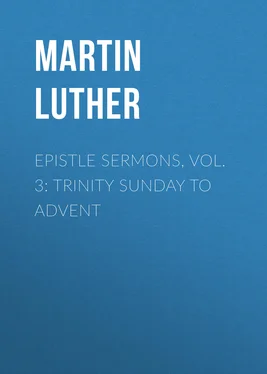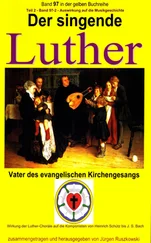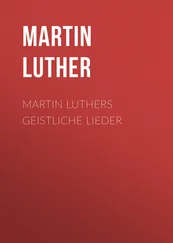Martin Luther - Epistle Sermons, Vol. 3 - Trinity Sunday to Advent
Здесь есть возможность читать онлайн «Martin Luther - Epistle Sermons, Vol. 3 - Trinity Sunday to Advent» — ознакомительный отрывок электронной книги совершенно бесплатно, а после прочтения отрывка купить полную версию. В некоторых случаях можно слушать аудио, скачать через торрент в формате fb2 и присутствует краткое содержание. Жанр: foreign_prose, foreign_religion, Философия, foreign_psychology, foreign_antique, на немецком языке. Описание произведения, (предисловие) а так же отзывы посетителей доступны на портале библиотеки ЛибКат.
- Название:Epistle Sermons, Vol. 3: Trinity Sunday to Advent
- Автор:
- Жанр:
- Год:неизвестен
- ISBN:нет данных
- Рейтинг книги:5 / 5. Голосов: 1
-
Избранное:Добавить в избранное
- Отзывы:
-
Ваша оценка:
- 100
- 1
- 2
- 3
- 4
- 5
Epistle Sermons, Vol. 3: Trinity Sunday to Advent: краткое содержание, описание и аннотация
Предлагаем к чтению аннотацию, описание, краткое содержание или предисловие (зависит от того, что написал сам автор книги «Epistle Sermons, Vol. 3: Trinity Sunday to Advent»). Если вы не нашли необходимую информацию о книге — напишите в комментариях, мы постараемся отыскать её.
Epistle Sermons, Vol. 3: Trinity Sunday to Advent — читать онлайн ознакомительный отрывок
Ниже представлен текст книги, разбитый по страницам. Система сохранения места последней прочитанной страницы, позволяет с удобством читать онлайн бесплатно книгу «Epistle Sermons, Vol. 3: Trinity Sunday to Advent», без необходимости каждый раз заново искать на чём Вы остановились. Поставьте закладку, и сможете в любой момент перейти на страницу, на которой закончили чтение.
Интервал:
Закладка:
40. Saint Paul does not simply say—as he does elsewhere—Of him are all things. He adds two other assertions, making a triple expression, and then unites the three thoughts into one whole when he says, "To him be the glory for ever." No doubt it was his intention therewith to convey the thought of this article of faith and to distinguish the three persons of the Godhead, even though he does not mention them by name, which is not necessary here. The ancient teachers also looked upon this passage as a testimony to the Holy Trinity. Their analysis was: All things are created by God the Father through the Son—even as he does all things through the Son—and are preserved, in God's good pleasure, through the Holy Spirit. So Paul is wont to say elsewhere; for example (1 Cor 8, 6): "There is one God, the Father, of whom are all things, and we unto him; and one Lord, Jesus Christ, through whom are all things." And concerning the Holy Spirit, Genesis 1, 31 says: "And God saw everything that he had made, and, behold, it was very good."
41. The Scriptures teach us that all creation is the work of one God, or the whole Godhead; and yet, inasmuch as they make a distinction between the three persons of the one Godhead, we may properly say that everything had its origin, everything exists and continues, in the Father as the first person; through the Son, who is of the Father; and in the Holy Spirit, who proceeds from both the Father and the Son; which three, nevertheless, are comprehended in the one undivided essence.
42. But how such a distinction of persons exists in the divine essence from eternity is a mystery which we shall and must leave unsolved. For we cannot, with our crude understanding, even fathom God's creatures; no creature is wise enough to understand these three parts of itself—the beginning, the middle and the end. Though they are distinct from each other, nevertheless they are so closely connected that we cannot with our physical senses separate one from the other. Who has ever been able to discover or explain the process by which a leaflet grows from a tree, or a tiny grain of corn becomes a root, or a cherry grows from the blossom to wood and kernel? Again, who can explain how the bodily members of a human being manifestly grow; what the sight of the eye is; how the tongue can make such a variety of sounds and words, which enter, with marvelous diversity, into so many ears and hearts? Much less are we able to analyze the inner workings of the mind—its thoughts, its meditations, its memory. Why, then, should we presume, with our reason, to compass and comprehend the eternal, invisible essence of God?
Trinity Sunday
THE DOCTRINE OF THE TRINITY. 1 1 This sermon was first printed in 1535, at Wittenberg.
1. This festival requires us to instruct the people in the dogma of the Holy Trinity, and to strengthen both memory and faith concerning it. This is the reason why we take up the subject once more. Without proper instruction and a sound foundation in this regard, other dogmas cannot be rightly and successfully treated. The other festivals of the year present the Lord God clothed in his works and miracles. For instance: on Christmas we celebrate his incarnation; on Easter his resurrection from the dead; on Whitsunday the gift of the Holy Spirit and the establishment of the Christian Church. Thus all the other festivals present the Lord in the guise of a worker of one thing or another. But this Trinity Festival discloses him to us as he is in himself. Here we see him apart from whatever guise assumed, from whatever work done, solely in his divine essence. We must go beyond and above all reason, leaving behind the evidence of created things, and hear only God's own testimony concerning himself and his inner essence; otherwise we shall remain unenlightened.
2. Upon this subject the foolishness of God and the wisdom of the world conflict. God's declaration that he is one God in three distinct persons, the world looks upon as wholly unreasonable and foolish; and the followers of mere reason, when they hear it, regard every one that teaches or believes it as no more than a fool. Therefore this article has been assailed continually, from the times of the apostles and the fathers down to the present day, as history testifies. Especially the Gospel of St. John has been subjected to attack, which was written for the special purpose of fortifying this dogma against the attacks of Cerinthus the heretic, who in the apostolic age already attempted to prove from Moses the existence of but one God, which he assigned as reason that our Lord Jesus cannot be true God on account of the impossibility of God and man being united in one being. Thus he gave us the prattle of his reason, which he made the sole standard for heaven to conform to.
3. O shameless reason! How can we poor, miserable mortals grasp this mystery of the Trinity? we who do not understand the operation of our own physical powers—speech, laughter, sleep, things whereof we have daily experience? Yet we would, untaught by the Word of God, guided merely by our fallible head, pronounce upon the very nature of God. Is it not supreme blindness for man, when he is unable to explain the most insignificant physical operation daily witnessed in his own body, to presume to understand something above and beyond the power of reason to comprehend, something whereof only God can speak, and to rashly affirm that Christ is not God?
4. Indeed, if reason were the standard of judgment in such matters, I also might make a successful venture; but when the conclusions of even long and mature reflections upon the subject are compared with Scripture, they will not stand. Therefore we must repeat, even though a mere stammering should be the result, what the Scriptures say to us, namely: that Jesus Christ is true God and that the Holy Spirit is likewise true God, yet there are not three Gods; not three divine natures, as we may speak of three brothers, three angels, three suns, three windows. There is one indivisible divine essence, while we recognize a distinction as to the persons.
SCRIPTURE PROOF THAT CHRIST IS GOD
Paul, speaking of Christ in Hebrews 1, 3, refers to him as the express image of God's substance. Again, in Colossians 1, 15 he says of Christ: "Who is the image of the invisible God, the firstborn of all creation." We must take these words for what they say—that all creatures, even angels and men, are ranked below Christ. This classification leaves room for God only: taking away the creature, only God remains. It is one and the same thing, then, to say that Christ is the firstborn of all creatures and that Christ is true and essential God.
5. To make the matter as clear as possible Paul uses the expression "image of the invisible God." If Christ be the image of God he must be a person distinct from him whose image he is, but at the same time in one divine essence with the Father. He and the Father are not one person, but two, and yet Christ could not be the express image of the Father's person, or essence, if he were not equally divine. No creature can be an image of the divine essence, for it does not possess that essence. To repeat, Christ could not be called the express image of God if he and the Father were not distinct persons; there must be one imaged and one who is the image. Expressed more clearly and according to Scripture, one person is the Father, who in eternity begets the other; the other is the Son, begotten in eternity, yet both are equally eternal, mighty, wise and just.
6. Though the Jews and Turks ridicule our doctrine, as if we taught the existence of three brothers in heaven, it does not signify. Might I also cavil were it to serve any purpose here. But they do us wrong and falsify our teaching; for we do not conceive of the Trinity as in the nature of three men or of three angels. We regard it as one divine essence, an intimacy surpassing any earthly unity. The human body and soul are not so completely one as the Triune God. Further, we claim the Holy Scriptures teach that in the one divine essence, God the Father begot a son. Before any creature was made, before the world was created, as Paul says, "before the foundation of the world," in eternity, the Father begot a Son who is equal with him and in all respects God like himself. Not otherwise could Paul call Christ the express image of the invisible God. Thus it is proven that the Father and the Son are distinct persons, and that nevertheless but one God exists, a conclusion we cannot escape unless we would contradict Paul, and would become Jews and Turks.
Читать дальшеИнтервал:
Закладка:
Похожие книги на «Epistle Sermons, Vol. 3: Trinity Sunday to Advent»
Представляем Вашему вниманию похожие книги на «Epistle Sermons, Vol. 3: Trinity Sunday to Advent» списком для выбора. Мы отобрали схожую по названию и смыслу литературу в надежде предоставить читателям больше вариантов отыскать новые, интересные, ещё непрочитанные произведения.
Обсуждение, отзывы о книге «Epistle Sermons, Vol. 3: Trinity Sunday to Advent» и просто собственные мнения читателей. Оставьте ваши комментарии, напишите, что Вы думаете о произведении, его смысле или главных героях. Укажите что конкретно понравилось, а что нет, и почему Вы так считаете.












